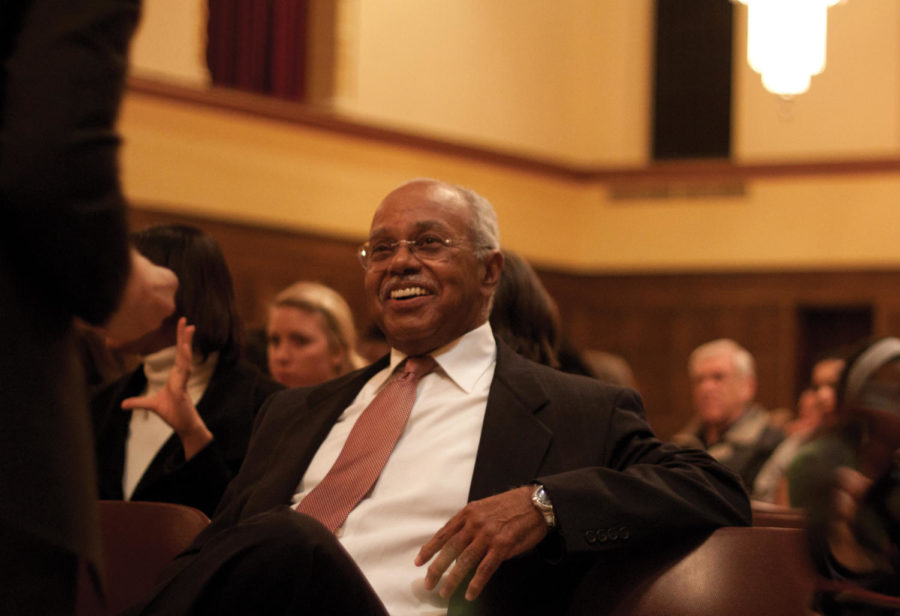History behind the Greensboro Four
Photo: Tsubasa Shigehara/Iowa State Daily
Joseph McNeil, founding member of the Greensboro Four, speaks about about his experiences on Tuesday, Feb. 15, at the Great Hall of Memorial Union. The Greensboro Four was a group of African American college students that held a sit-in for five months in the F.W. Woolsworth Company. Photo: Tsubasa Shigehara/Iowa State Daily
February 15, 2011
The four young men of Greensboro, N.C., had no idea what the future held for them when they started the non-violent protest of Woolworth’s department store in 1960.
“Young people were tasked to do extraordinary things, to show conviction when the odds were 100 to 1, to not give up and have that faith and the rightness of your cause,” said Joseph McNeil, one of the original group of protesters that became known as the Greensboro Four, in a lecture Tuesday at the Memorial Union.
McNeil gave his story on the sit-in that began 51 years ago.
He said how painful it was when he was 17 years old to see his parents being denied opportunities.
As a kid, he was encouraged to ask questions, but when it came to the “why” question, he was discouraged. He was not allowed to ask, “Why can’t I go into the white men’s restroom?” or, “Why is there such injustice in the world?”
The four freshmen at North Carolina Agricultural and Technical State University consisted of McNeil, Franklin McCain, Ezell Blair Jr. and David Richmond. They decided to sit down and go over what could happen if they formed a non-violent protest.
The four freshmen walked into Woolworth’s on Feb. 1, 1960. McNeil remembered he asked for a coffee and apple pie but was told they could not be served at that end of the counter.
Soon the patrolman that was called was circling the men, pounding the baton in his hands, “As if to say, ‘Any day now I’ll get the call to take action,'” McNeil said.
It did not take long for onlookers to start wondering what might happen to the four men sitting at the wrong counter.
McNeil remembered an elderly white woman, who was sitting six seats down, walked up behind McCain and McNeil and put her hands on their shoulders.
She then said, “Boys, I am disappointed in you.”
“Ma’am why would you be disappointed in us? You don’t know me,” McCain said.
“I am disappointed because it took you guys so long to do what you are doing,” the woman said.
McNeil said the event was “like a shot of adrenaline from a very unexpected source.”
After the store closed for the day, the boys vowed they would be back and they would keep coming back until they were served.
By the third day, McNeil said many important things that took place.
At this time, the group of only four men turned into a group of enough participants to fill all 64 seats at the lunch counter; 20 of those participants were women, and three were white co-eds.
Also on this day, the clan of the White Citizen’s Council showed up to provoke the students by pouring hot coffee on them and putting lit cigarettes into their clothes. However, this did not cause anyone to act out towards them.
The sit-in continued to grow to more than 125 participants, spreading to 25 southern cities, making the news of the Greensboro protest nation-wide. Martin Luther King Jr. came up to a town not far from Greensboro about two weeks after the sit-ins began. He expressed his support and reached out to offer his help.
Finally, Woolworth’s integrated its lunch counter July 25, 1960, and although McNeil was not in North Carolina at the time, he made sure to stop by for some apple pie when he was back in town.
However, for McNeil, it was never about that apple pie — it was always about the bigger picture.
“That small act sparked and created, if you will, a national movement,” McNeil said. “Little nights matter; you never really know the full effect they have on those around us.”
McNeil credited the success of the Greensboro sit-in to the other three men who started the movement along with all other citizens that took part around the country and participated in their own local non-violent protests.
“None of us got to where we are by ourselves we have gotten to where we are by the sacrifice of parents and the ability of people doing small things that turned out to be quite significant in our life.”

















